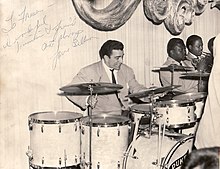Cat Anderson
William Alonzo "Cat" Anderson (* 12. September 1916 in Greenville , South Carolina ; † 29. April 1981 in Norwalk , California) was an American jazz - trumpet . Cat Anderson was best known for playing over five octaves, especially in the upper keys.
Live and act
Anderson lost both parents when he was four and grew up in an orphanage in Charleston, South Carolina. There he learned to play the trumpet in the Jenkins Orphanage Band . His nickname Cat is said to come from his fighting style in scuffles during his school days and was used by him all his life.
He first went on tour with the Carolina Cotton Pickers , a band made up of former members of the orphanage, and made his first records. He then played with guitarist Hartley Toots and in Claude Hopkins ' Big Band, in Doc Wheeler's Sunset Orchestra, with Lucky Millinder , the Erskine Hawkins Orchestra, the Sabby Lewis Orchestra and with Lionel Hampton , with whom he recorded the classic Flying Home .
He climbed a new step on the career ladder in 1944 when he became a member of the Duke Ellington Orchestra. It quickly became a central part of the Ellington Sound. Anderson could play a number of different styles of jazz, but playing in extremely high registers was his trademark. In his own words, it arose from the fact that another trumpeter kept taking the girls away from him by playing in high registers, which Anderson hoped to remedy by constantly playing that way himself. There are film recordings that show Anderson playing a solo without a microphone, while the other band members played in front of individual microphones. He played with Ellington from 1944 to 1949, from 1950 to 1959 and from 1961 to 1971, interrupted by periods when he tried to lead his own orchestra. In 1972 he performed at the Berlin Jazz Festival with the Charles Mingus Quintet (“ Perdido ”).
After Ellington's death, Anderson settled in Los Angeles , where he continued to make studio recordings with local bands such as Louie Bellsons and Bill Berry's big bands. Occasionally he toured Europe, especially with Lionel Hampton . He died in 1981 of a brain tumor.

swell
- Jazz: the Rough Guide (2nd edition). The Rough Guides, 2000. ISBN 1-85828-528-3
- "Cat Anderson" - Scott Yanow on All Music Guide
- Cat Anderson at Discogs (English)
| personal data | |
|---|---|
| SURNAME | Anderson, Cat |
| ALTERNATIVE NAMES | Anderson, William Alonzo |
| BRIEF DESCRIPTION | American jazz trumpeter |
| DATE OF BIRTH | September 12, 1916 |
| PLACE OF BIRTH | Greenville , South Carolina |
| DATE OF DEATH | April 29, 1981 |
| Place of death | Norwalk , California |
